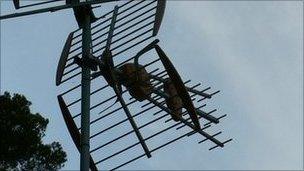Political split over south of Scotland ITV services
- Published

Regulator Ofcom is set to decide between two options for ITV services in southern Scotland
A political row is brewing over an impending shake-up in the ITV service in the south of Scotland.
Regulator Ofcom is set to decide between two rival options for the future of the former Border TV region.
One option would mean a weekly local programme specifically for the area - the other would see far more of STV's programmes of wider Scottish interest being shown.
Two members of the UK government are backing the return of a local programme but the Scottish government is keen to let viewers in the south see more STV programmes.
The future of the former Border TV region is one of the few areas of controversy to emerge in the process to renew the Channel 3 licences which expire at the end of next year.
Since 2009 the news service has been broadcast from Gateshead and shared, in part, with the service for the former Tyne Tees region while there have been no other regular local programmes.
ITV plans to make significant changes to the news service to make it much more focussed on the region but the question over what should happen to the rest of the regional schedule is more controversial.
There are two options.
ITV wants to produce a weekly current affairs programme focussed on local stories in the south of Scotland and Cumbria.
An alternative proposal (Option 2) to broadcast some STV programmes seen in the rest of Scotland - potentially the nightly current affairs programme Scotland Tonight.
It's argued that the second option would give viewers in the south of Scotland a service more comparable to the one provided to the rest of the country.
But the problem with it is that the extra Scottish programmes might be a turn off for Border's English viewers and that splitting the area between its Scottish and English parts could add to costs.
Ofcom is now deciding between the options after a public consultation which has now closed. Whichever is chosen, there is likely to be political criticism.

ITV wants a weekly current affairs programme focussed on the south of Scotland and Cumbria
In their responses, Scottish Secretary Michael Moore and his deputy David Mundell - both MPs in the Scottish part of the Border TV region - backed the idea of a new half-hour programme aimed at the whole of the TV region.
Scottish Borders Council and the Scottish government both preferred the option which could see STV's daily current affairs programme broadcast.
Mr Mundell's response said: "It is my belief that those supporting and vocally pushing for Option 2, are motivated by their personal political beliefs and their views, whilst perhaps vocal, do not represent majority opinion locally."
The Scottish government's response stated: "Only Option 2 has the capability of allowing Scottish viewers in the franchise area to see news and current affairs coverage of Scotland on a broadly comparable basis to viewers elsewhere in Scotland.
"Informing democratic debate is at the very heart of the public service broadcasting ethos and at present viewers in the Scottish portion of the franchise are short-changed by being denied access to programming on news and current affairs on the range of issue such as health, education and local government that are decided on in Scotland at the Scottish Parliament."
The Border TV region is something of a historic anomaly, broadly speaking covering the areas of Dumfries and Galloway, Scottish Borders and Cumbria councils.
Border is now part of ITVplc which also owns all the other former regional companies in England and Wales.
STV remains a separate company.
This made the idea of simply redrawing the TV regions and giving the south of Scotland to STV problematic.
Ofcom is expected to announce its decision in the next few weeks although the improved regional news service will be introduced whichever option is chosen.
- Published21 February 2013
- Published10 August 2011
- Published9 August 2011
- Published9 August 2011
- Published5 July 2011